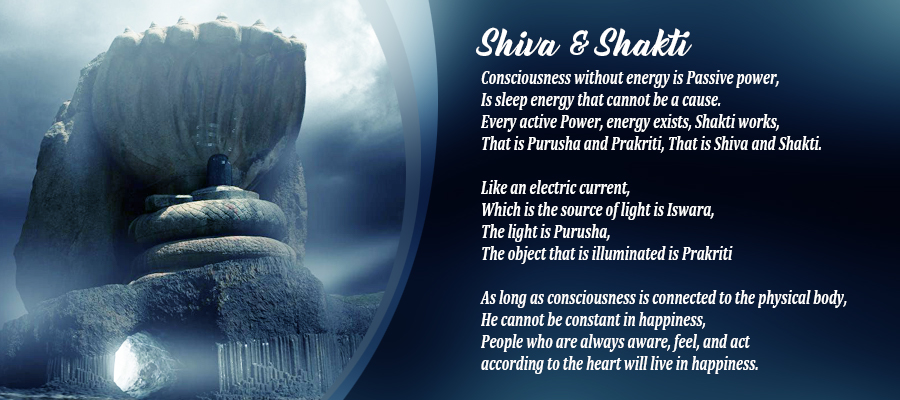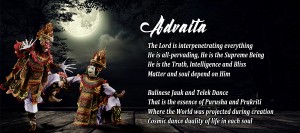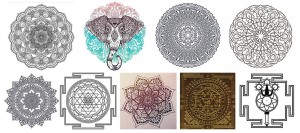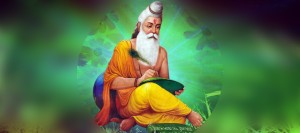Shiva is another name for the Absolute Reality or Absolute Consciousness that makes up our cosmos. Shiva is the transcendent aspect of cosmic consciousness or the Source of everything and all that is. Shiva, in all his steadfast union between the internal world and the external world, is often known as the Lord of Yoga. The power of Shiva’s consciousness can bring great inner strength and spaciousness.
Both Shiva and Shakti are alive in both men and women. All of us have divine masculine (Shiva) aspects and divine feminine (Shakti) aspects to our being. It’s said that our feminine side resides on our left side while the masculine resides on our right side. We hold these energies within us and, when united, there’s a complete balance, joy, and presence within our very being. Accessing each of our divine natures — both masculine and feminine — can be both enlightening and surprising. However, we need to remember that we carry within us both aspects of the Divine.
Here we’ll get to know more about the qualities of Shiva energy as well as Shakti energy, then, finally, the nature of these divine energies combined.
Whenever a power becomes active, and wherever energy exists, Shakti is working. Other terms for these primal principles are PURUSHA and PRAKRITI; Purusha is consciousness and Prakriti is nature.
Lord Shiva is generally portrayed holding a trident, which represents the trinity of Īshwara, Purusha, and Prakriti.
Īshwara is the omnipresent, eternal, formless divine principle; Purusha is the Ātmā and Prakriti is the manifestation, nature. Electric light can be used to explain their relationship. The electric current, which is the source of the light, is Īshwara; the light is Purusha, and the object that is illuminated is Prakriti.
SHAKTI (or Prakriti) means energy, power, movement, change, nature. It is the maternal principle – the provider, abundance. In the human as well as in the animal kingdom the mother offers nourishment, warmth, and security. There is no greater love than the love of a mother. The mother carries and nourishes the child in her own body. When it is born she provides it with mother’s milk and raises it at the sacrifice of her own self until it becomes self-reliant.
SHIVA (or Purusha), on the other hand, is pure consciousness – the unchanging, unlimited and unswayable observer. Purusha has no desires whatsoever; these are inherent only in Prakriti. Purusha is the empty, clear screen onto which Prakriti projects her colorful film.
Shiva and Shakti are manifestations of the all-in-one divine consciousness – different sides of the same coin. In many pictures these two primal powers are each depicted as being one half of the same image; one side female and one side male. The left side is the Divine Mother, Pārvatī, the “feminine” energy, and the right side represents Shiva, the “masculine” consciousness.
Through the splitting of the primordial principle at the advent of creation the duality within our lives came into being, together with a strong force that is constantly striving to re-unite with the other part.
Only when Shiva and Shakti combine can action, movement and creation arise. Until energy is impregnated with consciousness it is ignorant, disordered, aimless and “blind”. Energy alone can produce nothing; consciousness bestows upon it content, form and direction. Conversely, consciousness without energy is dormant power, sleeping energy, and on its own is unable to be the cause of anything. Just as Prakriti without Purusha is unable to act, and vice versa, Purusha without Prakriti is also incapable of creating anything.
The meaning of Shiva and Shakti is occasionally misunderstood when Shiva and Shakti are looked upon as “man” and “woman” and their union is regarded as a sexual relationship. Sexuality is something completely natural, and misunderstanding arises only when sexuality and spirituality are mixed.
- Sexuality is the union of man and woman
- Spirituality is the union of human and divine consciousness.
Shiva and Shakti exist within each of us as the masculine and feminine principles. This has an effect on the physical level – it is the cause of sexual attraction. Within man, there exists a tendency towards the feminine qualities and within the woman a tendency towards the masculine. Through this, the masculine consciousness is attracted by the feminine and vice versa. If both are in balance there is no sexual attraction. But if a tendency for the masculine predominates in man or the feminine in woman, this results in a preference for a homosexual partner.
Shiva resides in the Sahasrāra Chakra and Shakti in the Mūlādhāra Chakra. When Prakriti and Purusha unite in the Sahasrāra Chakra, knowledge, knower and the object of knowledge become one. Once we have experienced this no desires remain within us because we realize unequivocally that everything we have ever yearned for is carried within us. In this state of absolute consciousness, there are no polarities and therefore no more sorrows; there is only everlasting joy, unconditional love, unlimited compassion and total understanding for all living beings.
For as long as consciousness is connected to the physical body it is unable to remain constantly in the Sahasrāra Chakra and so returns to the residence of the Ātmā in the Heart Centre (Anāhata Chakra). A realized person always thinks, feels and acts from the heart. Embedded in eternal love and eternal happiness, that person is always conscious of the immortal Ātmā, the ocean of bliss, and their consciousness is forever connected to the divine consciousness.
- Shakti is the motherly love of God that surrounds us with warmth, caring, and protection.
- Shiva is the paternal love of God that gives us consciousness, clarity, and knowledge.
I wish for you the blessing of the Divine Mother who lives within you as energy and vitality, and the blessing of the Divine Father who resides within you as consciousness and knowledge. May they always take care of you, protect you and guide you, and in their infinite love lead you to the cosmic consciousness.





